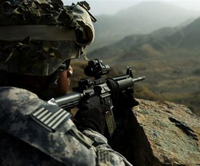The military operation that the U.S., the U.K. and France have launched against Libyan leader Moammar Gadhafi thus far lacks a clear set of strategic goals. The coalition partners cannot agree regarding whether the operation is intended to remove Gadhafi, to support rebel operations against Gadhafi loyalists or simply to protect civilians from attack by Gadhafi's military forces. The lack of a strong, well-defined set of strategic objectives means that military operations in and over Libya are likely to be incoherent. All this is bad enough, but perhaps worse is that there is little indication that France, the U.K. or the U.S. are prepared to commit sufficient forces to winning the war, and even less indication that they're interested in "winning the peace," should they eventually agree on basic objectives.
The maximalist interpretation of coalition goals would require the toppling of Moammar Gadhafi's regime, and a commitment to doing so would probably require resorting to the same model of warfare that the United States used in Afghanistan to depose the Taliban in 2001. The "Afghan Model" involves the combination of special forces, allied proxy fighting forces and heavy precision airpower. Proxies screen the special operators from attack, fix enemy positions and exploit tactical victories by seizing ground. Special forces operators identify targets and coordinate proxy ground assaults with precision strikes. Precision attacks from offshore aircraft and naval vessels either destroy enemy targets or sufficiently suppress them to allow proxy forces to overrun their positions. If it works -- and it more or less did in Afghanistan in 2001 -- the model can deliver victory with a minimal commitment of ground forces.
The situation in Libya is almost perfect for executing the Afghan Model. Allied forces are poorly disciplined, but have sufficient capabilities to fix Gadhafi loyalists and to screen Western special operations forces (SOF). Libya's terrain, particularly along the rebel axis of advance toward Tripoli, heavily favors the use of precision airpower. Loyalist forces are better-equipped and appear to be somewhat better-trained than the rebels, but they have little experience in evading precision airstrikes. In short, there is every reason to expect that an Afghan Model of proxy forces, supported by Western SOF and precision Western airpower, would defeat conventional Gadhafi loyalist forces in relatively short order, thereby opening the path to Tripoli.

